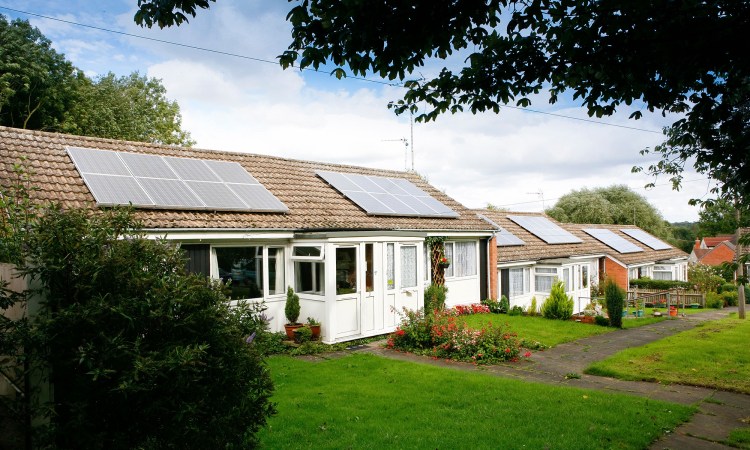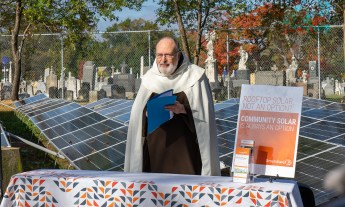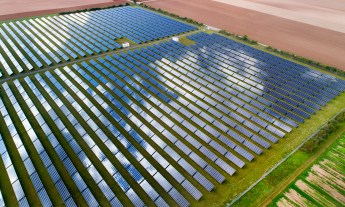
One of the biggest reasons our personal lifestyle choices matter when it comes to the climate crisis is that what we do changes us. And the other big reason is that what we do and say changes others, too.
And the contagion of seeing others act, says behavioral economist Robert Frank, can spread “more like outbreaks of measles or chicken pox than a process of rational choice.” The difference is that, unlike coronavirus, behavioral contagion can be a good thing.
As it turned out, having solar panels on a house near you was the biggest predictor of whether you’d get them yourself.
In 2015, two geographers noticed solar panels popping up on houses in their small US state of Connecticut. Curious, they set out to see if they could figure out what predicted who had them. Would they be in richer homes? Or in areas with higher population density?
Early adopters of solar panels tend to be people who are interested in innovative technology, who find an installer they trust, and who think having solar panels will benefit them. But once an early adopter made their choice, the geographers found, a cluster would spring up around them. Having solar panels on a house near you, where you could see them and talk to a real live person who had them, it turned out, was the biggest predictor of whether you’d get them yourself.
Why? Because it brought down the “cost” of information. You didn’t have to go somewhere or find a new person to talk to; they were right there beside you and ready and eager to bend your ear with all the information you needed to make the same choice they had.
Even those of us concerned about the climate often feel as if we can’t make much of a difference. One US survey showed over 50% of respondents feel helpless when they think about climate change.
Soon the Connecticut study was being replicated — in Sweden, in China, and in Germany, where they actually put a number on it. Rooftop solar installations were most influential, they found, on neighbors who lived within one kilometer. A Swiss study went one step further and recommended that such hot spots be deliberately created to spur adoption.
By 2020, 21 percent of homes in Australia had rooftop solar. Government mandates in the state of California and the city of South Miami mean that most new homes there must have rooftop solar, too. In 2021, the global rooftop solar industry was valued at nearly $40 billion worldwide and expected to pass $80 billion by 2027.
Five years ago, Texas wasn’t even in the top 10 of commercial solar energy producing states. Fast-forward to 2020 and every few weeks, it seemed, there was a new update on solar in Texas. Similarly, five years ago I didn’t know of more than one or two homes in our city of over a quarter million people that had rooftop panels. Then, just before Christmas two years ago, my husband surprised me by saying he’d bought us solar panels as a holiday gift.
And here’s the best part: He’d purchased them from a local company that uses panels manufactured by a company called Mission Solar in San Antonio. The last time oil prices tanked and many rig workers in West Texas lost their jobs, Mission Solar took them in and retrained them to manufacture solar panels. It is part of the just transition movement — and because we bought from them, we are, too.
Having the panels, and knowing who we got them from, gives me something to talk about that I love. Now three other people we know have them, and within six months, there was another set of solar panels on an unknown neighbor’s house, one block over. Today, I know a local business and a church that are considering them, too. Yes, solar panels cut my carbon emissions, but they also make me feel empowered, as if what I do matters. They gave me a sense of efficacy.
When you hear or see or learn about what the real solutions look like and how many of them are already being implemented or will be in the near future, that can increase your efficacy.
What’s “efficacy”? Stanford psychologist Albert Bandura has been studying human behavior for decades. In 1977, he proposed — and proved — that people change their behavior if they feel self efficacy, which he defined as “the belief in one’s capabilities to organize and execute a course of action.”
Surveys of people in different countries show that people’s sense of efficacy when it comes to climate change is not high. Even those of us who are concerned about climate change often feel as though we can’t make much of a difference. In the US, one survey showed that over 50 percent of Americans feel helpless when they think about climate change. Another survey found that more than 50 percent “don’t know where to start” when it came to climate action.
The research on what builds our sense of efficacy when it comes to climate action is still emerging, but the bottom line is pretty intuitive. When you hear or see or learn about what the real solutions look like and how many of them are already being implemented or will be in the near future, that can increase your efficacy. And when you see someone do something or find out about something you can do in your personal life — that increases your efficacy, too.
It’s a positive feedback cycle. When we feel empowered to act, individually and communally, that makes us not only more likely to act, but to support others who do. It’s a very human response that has been identified again and again around the world.
No matter what our place in society, important problems don’t get fixed until enough ordinary people mobilize to take action.
It also inoculates us against despair. Young people who are anxious about climate change, one survey found, aren’t paralyzed by it if they are able to act. People along the US Gulf Coast who were affected by the Deepwater Horizon oil spill turned out to be less depressed if they were participating in the cleanup themselves and actively doing something about it. And in general, the more we do something, the more it matters to us — and the more we care.
It’s not about being a lone ranger, either. Collective efficacy is even more important — the idea that together, as a community, we can make a difference. That’s why it’s so important to seek out like-minded groups: other athletes, parents, fellow birders, Rotarians or people who share our faith. Together, our actions add up; it’s not just us alone anymore.
No matter what our place in society, important problems don’t get fixed until enough ordinary people mobilize to take action. It isn’t only about what we accomplish ourselves: connecting with others imbues us with a stronger sense of collective efficacy and builds a network of like-minded people.
Sharing our opinions and actions alters social norms, the informal rules that govern our behavior. This in turn makes us more likely to support politicians who want climate action and policies to reduce carbon emissions, more likely to speak out about the need for climate solutions, and more likely to be in favor of the changes required to address climate change at scale. It’s like knocking over the first domino: Action eventually changes us all.
Reprinted with permission from the new book Saving Us: A Climate Scientist’s Case for Hope and Healing in a Divided World by Katharine Hayhoe. Copyright ©2021. Published by Atria/One Signal Publishers, a division of Simon & Schuster.
Watch Katharine Hayhoe’s TED Talk here:











